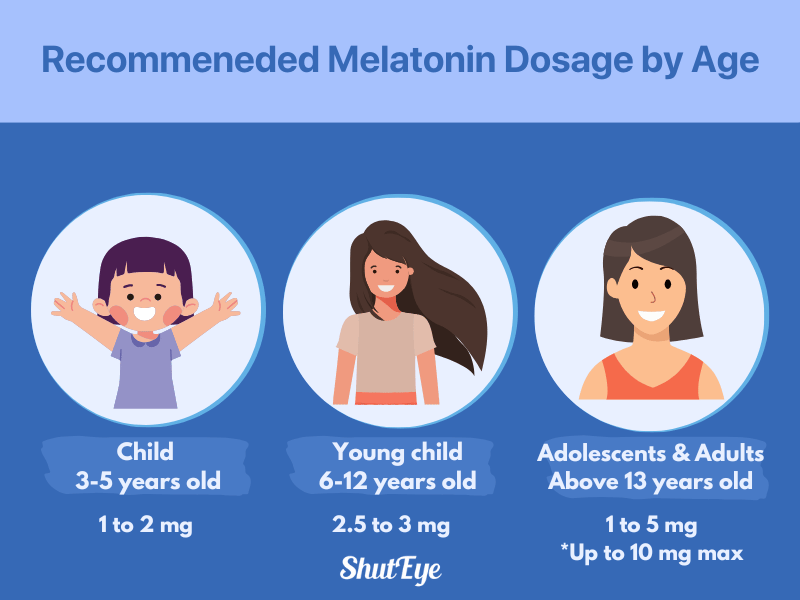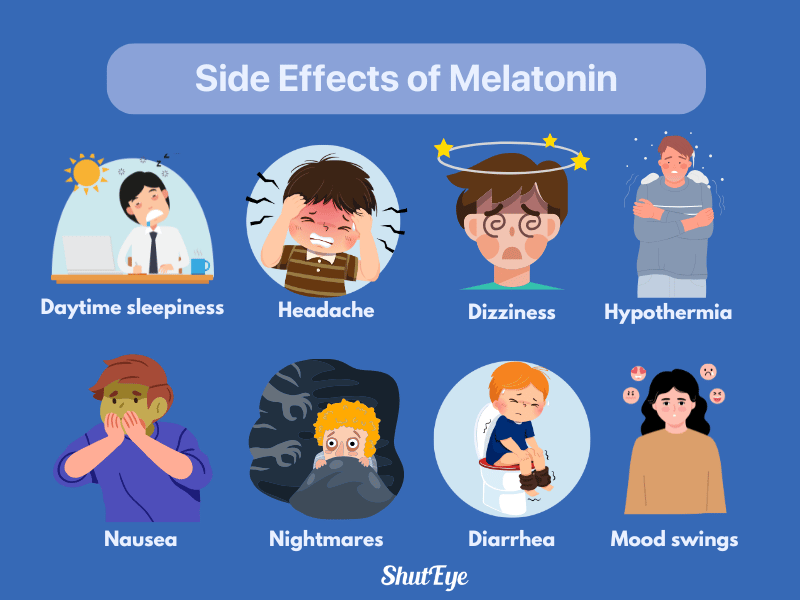


How much melatonin should I take at night? If you find yourself asking this question, it means that you’ve been struggling with some sleep issues. Perhaps, making changes to your lifestyle habits did not help and so, you are looking for a more effective alternative.
This article will cover what melatonin is, how it works, and, most importantly, help you determine the appropriate dosage to support better sleep.

Melatonin is a sleep hormone that is produced by your brain as a response to darkness. It is what helps to regulate your body’s circadian rhythm, also known as your body’s internal clock, such that you’ll be able to fall asleep at night [1].
Normally, our bodies can produce up to 0.3 mg of melatonin per day. However, this can change throughout life. Certain influences such as light exposure may also block melatonin production, causing melatonin levels in the body to decrease [1].
A lack of melatonin production or lowered melatonin levels can result in trouble falling asleep or staying asleep. One way to tackle this issue is by taking melatonin supplements.
Melatonin supplements can come in many different forms such as capsules, tablets, gummies, liquids, and more, with different dosage levels. Most often, the doses range between 0.1 mg to 10mg.
General guidelines recommend for adults to get up to 8 mg of melatonin and a maximum of no more than 10 mg daily [2]. If you’re new to melatonin, you may want to start with a low dose (1 mg to 2 mg) and gradually increase it as needed.
Consuming too much melatonin too fast can lead to adverse side effects such as grogginess, sluggishness, or even vivid dreams. These effects may be worse, especially for older adults [3].
Taking more than 10 mg of melatonin supplement daily is usually not recommended as it can increase the risk of melatonin overdose. You want to follow the prescription labels or the recommended guidelines. For adults, this means no more than 10 mg a night, and for young children, no more than 3 mg a night [4].
Melatonin is generally safe for kids to consume, however, the American Academy of Pediatrics (AAP) urges parents to be cautious and speak to a pediatrician before deciding whether their children should take melatonin supplements [5]. The typical melatonin dose recommended for young children is between 2.5 mg to 3 mg and between 5 mg to 10 mg for adolescents [6].
Taking melatonin will not solve a child’s long-term sleep problems. Instead, maintaining a healthy bedtime routine requires discipline and hard work.


Common adverse side effects of melatonin frequently reported include [7], [8]:

Melatonin supplements can be beneficial for people who want to fall asleep faster but are dealing with problems such as [1] :
In general, it is not recommended for pregnant women to consume melatonin supplements due to its little-known effects on babies and their health.
The lack of clinical trials of melatonin use during pregnancy and breastfeeding also makes it hard for researchers to conclude the safety of its use [9], [10].
When it comes to finding the right melatonin supplement for you, you want to consider these key factors:
To start taking melatonin to improve your sleep quality, consider following these tips:
Overall, melatonin supplements are useful sleep aids for improving sleep quality. If you do need to take them, ensure that you are not taking more than 10 mg for adults and no more than 3 mg for young children. It’s also important that you consult a healthcare provider before taking them for your safety.
Alternatively, you can also improve your sleep quality by trying out the ShutEye® app. ShutEye is a patented sleep-tracking app that monitors your sleep and offers personalized solutions to optimize it. Try for FREE today!
Bauer, B. (2022) Is melatonin a helpful sleep aid — and what should I know about melatonin side effects? [online]. Available at: https://www.mayoclinic.org/healthy-lifestyle/adult-health/expert-answers/melatonin-side-effects/faq-20057874
Barat, J. (2023) Melatonin Dosages: Your GoodRx Guide [online]. Available at: https://www.goodrx.com/melatonin/dosage
Besag, F. M. C., Vasey, M. J., Lao, K. S. J., & Wong, I. C. K. (2019). Adverse Events Associated with Melatonin for the Treatment of Primary or Secondary Sleep Disorders: A Systematic Review. CNS drugs, 33(12), 1167–1186. Available at: https://doi.org/10.1007/s40263-019-00680-w
Drugs.com (2024) Melatonin [online]. Available at: https://www.drugs.com/melatonin.html
Cummings, C., & Committee, C. P. (2012). Melatonin for the management of sleep disorders in children and adolescents. Paediatrics & Child Health, 17(6), 331. Available at: https://pmc.ncbi.nlm.nih.gov/articles/PMC3380753/
Modi, J. (2024) How Much Melatonin is Safe to Take? [online]. Available at: https://www.buzzrx.com/blog/how-much-melatonin-is-safe-to-take
NHS (2023) Pregnancy, breastfeeding and fertility while taking melatonin [online]. Available at: https://www.nhs.uk/medicines/melatonin/pregnancy-breastfeeding-and-fertility-while-taking-melatonin/
NIH (2024) Melatonin: What You Need To Know [online]. Available at: https://www.nccih.nih.gov/health/melatonin-what-you-need-to-know
Vine, T., Brown, G. M., & Frey, B. N. (2021) Melatonin use during pregnancy and lactation: A scoping review of human studies. Brazilian Journal of Psychiatry, 44(3), 342. Available at: https://doi.org/10.1590/1516-4446-2021-2156
Whalen, I. (2021) hinking about melatonin to help kids sleep? Ask your pediatrician [online]. Available at: https://publications.aap.org/aapnews/news/16325/Thinking-about-melatonin-to-help-kids-sleep-Ask?autologincheck=redirected